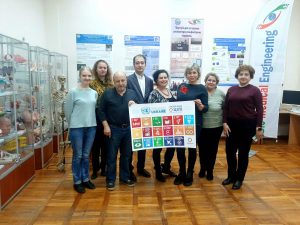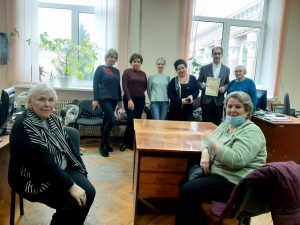Within the framework of cooperation with V.G. Korolenko Kharkiv State Scientific Library, a seminar on the role of libraries in achieving the Sustainable Development Goals was organized.
Presentations were made by Vasiliy V. Rossikhin – urologist, biotechnologist, doctor of medical sciences, professor of the Department of Urology at KMAPO, and Oleg G. Avrunin – doctor of technical sciences, professor, head of the BME Department.
The essence of each Goal was examined and demonstrated how libraries contribute to their achievement.
In particular, it was noted that libraries are unique social institutions, which can be included in all areas and spheres of public life and have great potential for their intensive development. The same is true for achieving the Sustainable Development Goals. Here libraries have the potential to influence both the implementation of the goals and to get as many people as possible to join in their realization. First and foremost, of course, through library collections, paper and electronic. Through educational and outreach activities. Through promotion and effective actions.
Libraries support almost all of the Sustainable Development Goals.
- Promote literacy, including media, information and digital literacy;
- Fill gaps in access to information and help government, civil society and business better understand local information needs;
- Assist in the implementation of government programs;
- Serve as hubs for research groups, including environmental issues;
- Preserve and provide access to the world’s culture and heritage.
Goal 4. Quality education – school-age children are more engaged with librarians – clubs, clubs, lectures, educational and theoretical-cognitive projects, workshops, labs – all in libraries. STEM activities in libraries based on a new generation of innovative non-fiction books. Makeries in libraries allow a range of technical and technological innovations to be tried out, encourage synergy with the technical world and the use of interactive learning methods, and introduce children to research outside the school walls.
Goal 5. Promote gender equality and empower women and girls. Libraries hold discussions, roundtables, lectures and even anti-lectures to expand basic knowledge on gender issues. Some are indeed focal, informational, and educational centers for gender policy.
Goal 8. Decent Work and Economic Growth – By implementing a lifelong learning approach, libraries contribute significantly to the retraining and career development of community residents.
Goal 15. Protection and restoration of terrestrial ecosystems – through themed evenings, eco-quests, excursions to the native land, volunteering to raise the environmental awareness of citizens, raising the awareness of residents about the environmental situation, improving and beautifying the community areas, uniting residents around environmental issues.
Goal 16. Peace, Justice, and Powerful Universities. One of the key objectives of this Goal is the development of the system of providing free legal aid. And here libraries are reliable partners for access to free legal aid for the least protected categories of citizens.
As a result, Oleg Grigorievich expressed his hope for further development of mutually beneficial partnership with the V.G. Korolenko library, in particular, with the department of scientific and information support of innovation processes to achieve the Sustainable Development Goals.


